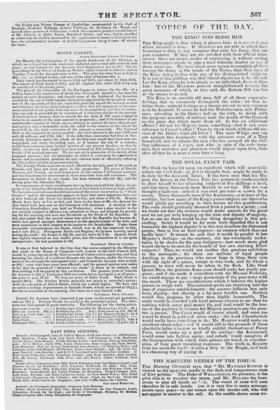THE ROYAL FANCY FAIR.
WE think we have hit upon an expedient which will materially reduce the Civil List ; or, if it is thought best, might be made to do duty for the Assessed Taxes. It has been seen that her Ma- jesty the Queen, at the Fancy Fair, has graciously condescended. to show herself to her admiring subjects at five shillings a head, and that many thousands have flocked to see her. The tax was thought a light one : indeed it was cent per cent-a crown for a crown. These thousands were of the Aristocracy, or at least of the wealthy; but how many of the King's poorer subjects are there who would gladly pay according to their means for this gratification. The scale should gradually descend from a pound to a penny ; and we doubt not that the revenue would make amends for the great cost we are put to by keeping up the state and dignity of majesty. Let no one say there would be any thing derogatory in this pro- ceeding. Surely it would be far more truly dignified (for is not humanity the highest dignity ?) in this way to relieve the distressed people, than to live at their expense-an expense which they can hardly bear ? It cannot be said that it would be painful to her Majesty's feelings : on the contrary, she has voluntarily under- taken to be shown for the poor foreigners-how much more glad would she be to be seen for the benefit of her own starving fellow subjects ? Then we would not confine this gracious exhibition to the metropolis ; for there are millions of loyal people dwelling in the provinces who never hope to bless their eyes with the sight of a queen, except in wax-work, and by whom a journey to town will never be taken in the flesh. Like Good Queen BESS, the gracious ADELAIDE should make her yearly pro- gress; and if she made it coincident with the Musical Festivals, we would engage to pay a large percentage of the poor-rates with the result. These are considerations which it behoves the higher powers to weigh well. Discontented spirits are inquiring into the uses of expensive establishments : the answer hitherto has only been, dignity; but charity is a far more forcible one. Neither would this progress be other than highly honourable. The roads would be crowded with loyal persons anxious to see that for nothing which many paid money for, and loud would be the hur- ras of the populace to witness her Majesty passing to pay the poor- tax in person. The Court would of course attend, and some use would be found in gold and silver sticks : the Lord Chamberlain would really have something to do; Mr. BARTON would make an excellent check-taker; and it would add to the proceeds if those charitable ladies who now so kindly exhibit themselves at Fancy Fairs, would make up a part of the cortege: the Aristocracy would come into fashion again; and nobody would complain of the disproportion with which their palaces are taxed, in consider- ation of their great travelling expenses. The truth is, Royalty lives too much for itself: it owes a duty to the People, and here is a charming way of paying it.


















 Previous page
Previous page